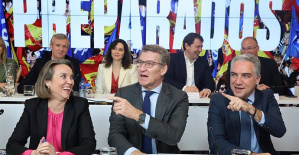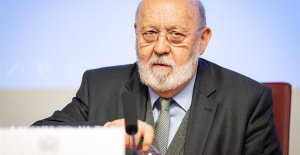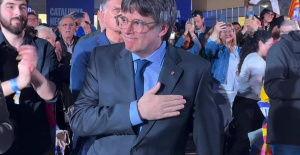Together with the company, it must compensate the injured parties with more than 125 million euros
The Supreme Court (TS) has reduced the prison sentence handed down by the National Court against the former president of Pescanova Manuel Fernández de Sousa-Faro by two years, from 8 to 6, by acquitting him of the crimes of fraud, document falsification and applying an extenuation for undue delays, confirming the rest of the sentence for manipulating the accounts to attract investors.
Thus, in a ruling dated February 10, the Criminal Chamber ratified the conviction of Fernández de Sousa-Faro as the perpetrator of a continuous crime of falsifying the annual accounts in media competition with an also continuous crime of falsifying economic information. and financial, as well as for the crime of confiscation of assets.
The court also maintains that, jointly and severally with the Pescanova company, it must compensate the injured investors, both companies and individuals, with more than 125 million euros.
Pescanova is still facing the penalty handed down by the National Court, a fine of 21,600 euros, although she is now considered the author of a crime of falsifying economic-financial information and has been acquitted of the crime of fraud.
The magistrates of the Second Chamber also acquitted the other accused of the crimes of falsifying a commercial document and aggravated fraud, for which reason they also reduced their sentences.
Former financial directors Antonio Taboas and Carlos Turci, accounting directors Alfredo López Uroz and investor relations directors Joaquín Viña all go from 3 years and 6 months to 1 year and 3 months.
The former head of accounting Ángel González is reduced from 3 years and 6 months to 1 year; the former head of service Alfonso García, from 2 years to 1 year and 3 months; and the wife of the former president of Pescanova, Rosario Andrade, from 1 year to 6 months.
The convictions, as necessary cooperators of the crime of falsification in the annual accounts, of several executives of the company are also maintained, although they are imposed less punishment considering that they do not have the conditions, qualities or personal relationships that justify the guilt of the author.
ABSOLVES THE AUDITORS
In addition, the Supreme Court acquits the external auditor of Pescanova, the auditing company and, in terms of civil liability, the latter's insurer, considering that the former had a careless or inattentive conduct but not the malicious behavior that is required with respect to the crimes for which he was convicted.
They are the BDO auditor Santiago Sañé, who was sentenced to 3 years and 6 months; the BDO itself, which received a fine as Sañé's subsidiary civil liability; and Mapfre, also sentenced as a joint civil liability with BDO to compensate investors up to a certain amount.
In the same way, the Supreme Court exonerates two companies that had been convicted as necessary cooperators of the crime of seizure of assets because it understands that the acts carried out by natural persons were not for the direct or indirect benefit of those.
IRREGULAR PRACTICES OF THE DOME
The ruling of the National Court recounted irregular practices carried out by the former leadership of Pescanova, headed by Fernández de Sousa-Faro with the collaboration of the heads of the most relevant departments.
The ruling indicated that as a result of the financial crisis that broke out in 2008, the president of the Galician firm, in order to continue enjoying the bank financing on which Pescanova depended due to the investment effort exerted in previous years, planned, together with a group of people they trust, continue to obtain financing through a series of mechanisms or irregular practices.
Once this was achieved, he pointed out, another series of manipulations were carried out on the annual accounts or other official documents that reflected the financial situation of the company "to achieve positive results that did not correspond to the real situation and, after being officially published, made it possible to attract new investors and displace bank financing and its excessive commissions".

 Exploring Cardano: Inner Workings and Advantages of this Cryptocurrency
Exploring Cardano: Inner Workings and Advantages of this Cryptocurrency Seville.- Economy.- Innova.- STSA inaugurates its new painting and sealing hangar in San Pablo, for 18 million
Seville.- Economy.- Innova.- STSA inaugurates its new painting and sealing hangar in San Pablo, for 18 million Innova.- More than 300 volunteers join the Andalucía Compromiso Digital network in one month to facilitate access to ICT
Innova.- More than 300 volunteers join the Andalucía Compromiso Digital network in one month to facilitate access to ICT Innova.-AMP.- Ayesa acquires 51% of Sadiel, which will create new technological engineering products and expand markets
Innova.-AMP.- Ayesa acquires 51% of Sadiel, which will create new technological engineering products and expand markets The PP sees the concentration of support for Sánchez in Ferraz as a "failure" and believes that it "complicates" the story of its continuity
The PP sees the concentration of support for Sánchez in Ferraz as a "failure" and believes that it "complicates" the story of its continuity Marc Márquez returns to pole in Jerez
Marc Márquez returns to pole in Jerez The CIS carries out a quick survey on Sánchez's letter to measure the reaction of citizens
The CIS carries out a quick survey on Sánchez's letter to measure the reaction of citizens 12M.- Puigdemont to Sánchez and Illa: "This is not about the future of the PSOE! What have you believed?"
12M.- Puigdemont to Sánchez and Illa: "This is not about the future of the PSOE! What have you believed?" How Blockchain in being used to shape the future
How Blockchain in being used to shape the future Not just BTC and ETH: Here Are Some More Interesting Coins Worth Focusing on
Not just BTC and ETH: Here Are Some More Interesting Coins Worth Focusing on UPV students build a prototype of a wooden house to move to Equatorial Guinea
UPV students build a prototype of a wooden house to move to Equatorial Guinea The UA opens the call for the Impulso 2024 Awards for the best innovative business initiatives
The UA opens the call for the Impulso 2024 Awards for the best innovative business initiatives ALI, virtual assistant from Alicante, internationally recognized by the OECD
ALI, virtual assistant from Alicante, internationally recognized by the OECD Retrópolis brings the golden age of video games and computing to the UPV
Retrópolis brings the golden age of video games and computing to the UPV A million people demonstrate in France against Macron's pension reform
A million people demonstrate in France against Macron's pension reform Russia launches several missiles against "critical infrastructure" in the city of Zaporizhia
Russia launches several missiles against "critical infrastructure" in the city of Zaporizhia A "procession" remembers the dead of the Calabria shipwreck as bodies continue to wash up on the shore
A "procession" remembers the dead of the Calabria shipwreck as bodies continue to wash up on the shore Prison sentences handed down for three prominent Hong Kong pro-democracy activists
Prison sentences handed down for three prominent Hong Kong pro-democracy activists ETH continues to leave trading platforms, Ethereum balance on exchanges lowest in 3 years
ETH continues to leave trading platforms, Ethereum balance on exchanges lowest in 3 years Investors invest $450 million in Consensys, Ethereum incubator now valued at $7 billion
Investors invest $450 million in Consensys, Ethereum incubator now valued at $7 billion Alchemy Integrates Ethereum L2 Product Starknet to Enhance Web3 Scalability at a Price 100x Lower Than L1 Fees
Alchemy Integrates Ethereum L2 Product Starknet to Enhance Web3 Scalability at a Price 100x Lower Than L1 Fees Mining Report: Bitcoin's Electricity Consumption Declines by 25% in Q1 2022
Mining Report: Bitcoin's Electricity Consumption Declines by 25% in Q1 2022 Oil-to-Bitcoin Mining Firm Crusoe Energy Systems Raised $505 Million
Oil-to-Bitcoin Mining Firm Crusoe Energy Systems Raised $505 Million Microbt reveals the latest Bitcoin mining rigs -- Machines produce up to 126 TH/s with custom 5nm chip design
Microbt reveals the latest Bitcoin mining rigs -- Machines produce up to 126 TH/s with custom 5nm chip design Bitcoin's Mining Difficulty Hits a Lifetime High, With More Than 90% of BTC Supply Issued
Bitcoin's Mining Difficulty Hits a Lifetime High, With More Than 90% of BTC Supply Issued The Biggest Movers are Near, EOS, and RUNE during Friday's Selloff
The Biggest Movers are Near, EOS, and RUNE during Friday's Selloff Global Markets Spooked by a Hawkish Fed and Covid, Stocks and Crypto Gain After Musk Buys Twitter
Global Markets Spooked by a Hawkish Fed and Covid, Stocks and Crypto Gain After Musk Buys Twitter Bitso to offset carbon emissions from the Trading Platform's ERC20, ETH, and BTC Transactions
Bitso to offset carbon emissions from the Trading Platform's ERC20, ETH, and BTC Transactions Draftkings Announces 2022 College Hoops NFT Selection for March Madness
Draftkings Announces 2022 College Hoops NFT Selection for March Madness























